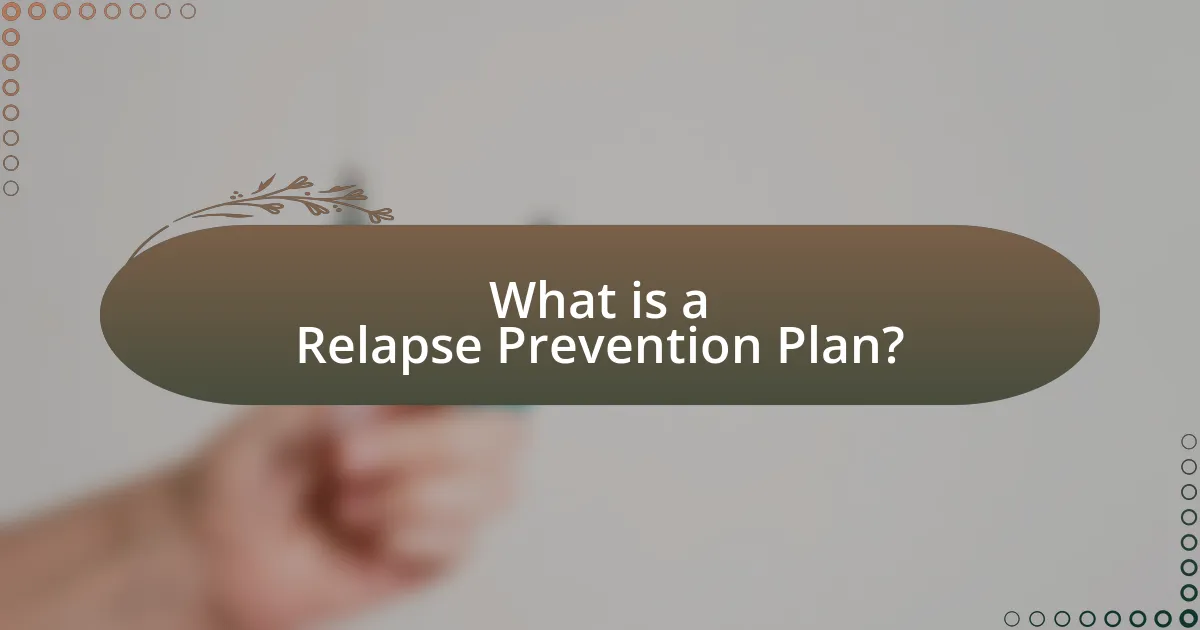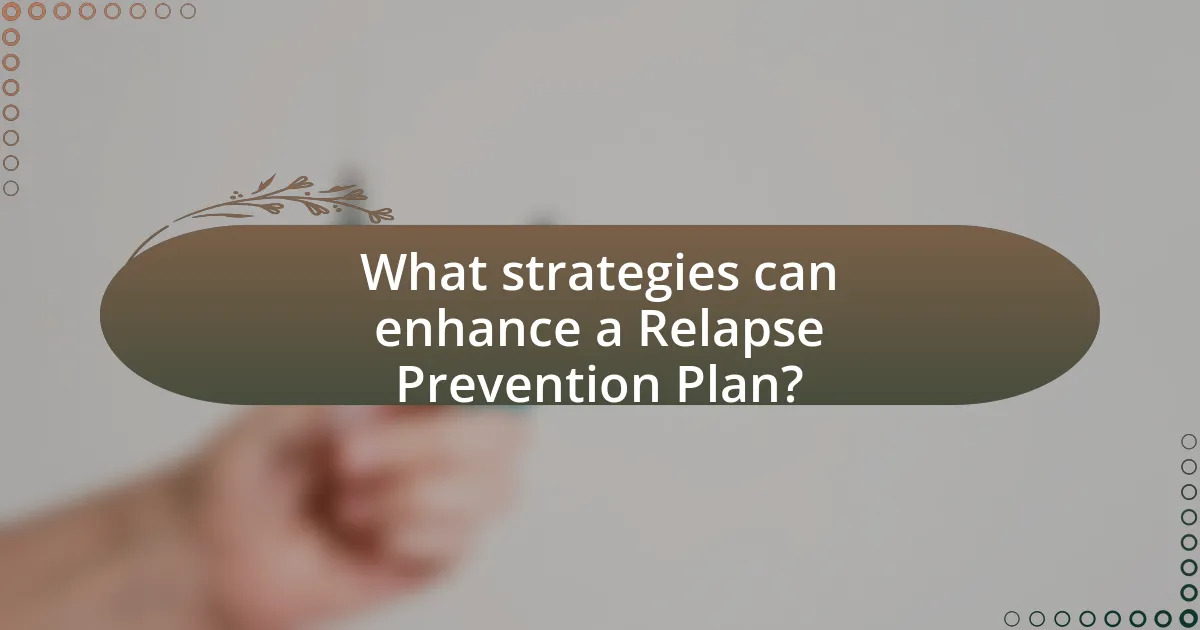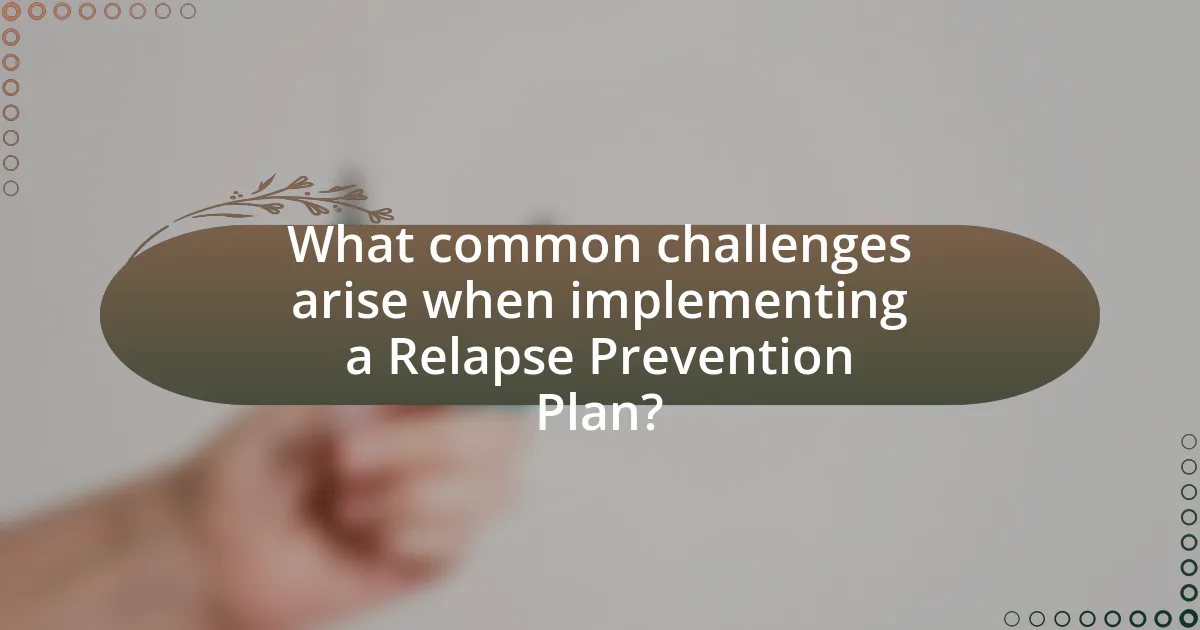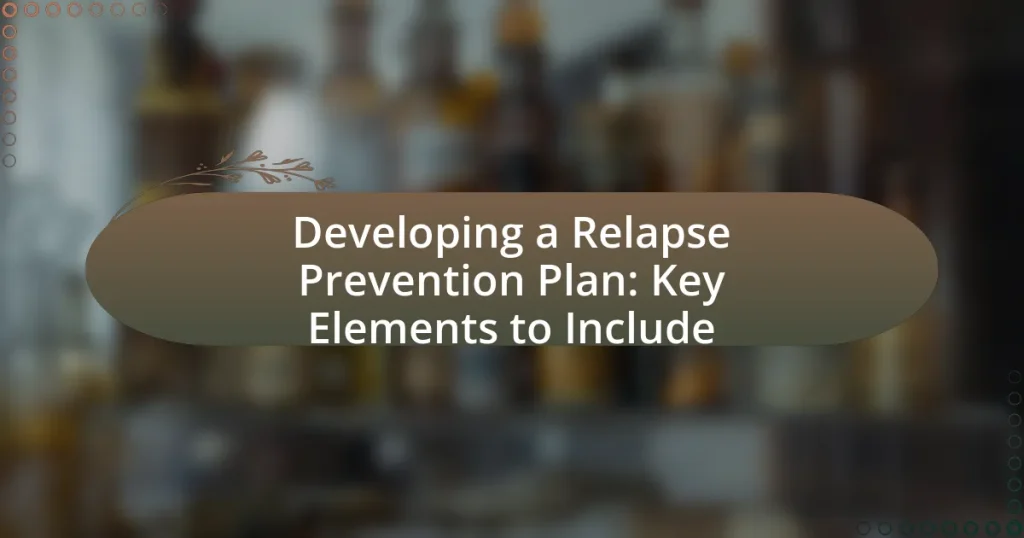A Relapse Prevention Plan is a structured strategy aimed at helping individuals maintain recovery from addiction by identifying triggers and developing coping mechanisms. This article outlines the importance of such plans in sustaining long-term sobriety, emphasizing key goals like recognizing triggers, establishing support systems, and implementing coping strategies. It also discusses the core components of an effective plan, the role of self-monitoring, and the significance of adapting the plan over time based on personal experiences and feedback. Additionally, the article highlights common challenges faced during implementation and offers best practices for maintaining commitment to the plan, ultimately enhancing the likelihood of successful recovery.

What is a Relapse Prevention Plan?
A Relapse Prevention Plan is a structured approach designed to help individuals maintain their recovery from addiction by identifying triggers and developing coping strategies. This plan typically includes specific strategies for managing high-risk situations, recognizing early warning signs of relapse, and implementing support systems such as therapy or support groups. Research indicates that individuals with a well-defined relapse prevention plan are significantly more likely to sustain long-term recovery, as it equips them with the tools necessary to navigate challenges effectively.
Why is a Relapse Prevention Plan important for recovery?
A Relapse Prevention Plan is crucial for recovery because it provides individuals with strategies to identify and manage triggers that could lead to relapse. This proactive approach helps maintain sobriety by equipping individuals with coping mechanisms and support systems tailored to their specific needs. Research indicates that structured relapse prevention strategies significantly reduce the likelihood of relapse, with studies showing that individuals who utilize such plans have a higher success rate in maintaining long-term recovery.
What are the key goals of a Relapse Prevention Plan?
The key goals of a Relapse Prevention Plan are to identify triggers, develop coping strategies, and establish a support system. Identifying triggers involves recognizing situations, emotions, or thoughts that may lead to relapse, which is crucial for preemptive action. Developing coping strategies equips individuals with practical tools to manage cravings and stress, thereby reducing the likelihood of relapse. Establishing a support system ensures that individuals have access to resources and encouragement from peers or professionals, which has been shown to significantly improve recovery outcomes. These goals collectively aim to enhance self-awareness and resilience in individuals recovering from addiction.
How does a Relapse Prevention Plan support long-term sobriety?
A Relapse Prevention Plan supports long-term sobriety by providing individuals with structured strategies to identify and manage triggers that may lead to substance use. This plan includes coping mechanisms, support systems, and specific actions to take when faced with high-risk situations, which collectively enhance an individual’s ability to maintain sobriety. Research indicates that individuals who actively engage in relapse prevention strategies are significantly less likely to relapse; for instance, a study published in the Journal of Substance Abuse Treatment found that participants who utilized a structured relapse prevention plan experienced a 50% reduction in relapse rates compared to those who did not.
What are the core components of a Relapse Prevention Plan?
The core components of a Relapse Prevention Plan include identifying triggers, developing coping strategies, creating a support network, and establishing a plan for managing high-risk situations. Identifying triggers involves recognizing specific situations, emotions, or environments that may lead to relapse. Developing coping strategies entails creating actionable responses to these triggers, such as engaging in alternative activities or practicing mindfulness. A support network consists of friends, family, or support groups that provide encouragement and accountability. Finally, establishing a plan for managing high-risk situations ensures that individuals have a clear course of action to follow when faced with potential relapse scenarios. These components are essential for maintaining long-term recovery and reducing the likelihood of relapse.
What role do triggers play in a Relapse Prevention Plan?
Triggers play a critical role in a Relapse Prevention Plan by identifying specific stimuli that can lead to a return to substance use or undesirable behaviors. Recognizing these triggers allows individuals to develop strategies to avoid or cope with them effectively. Research indicates that approximately 70-90% of individuals in recovery experience triggers that can provoke cravings, making it essential to address them in any prevention strategy. By understanding the nature of their triggers—whether they are emotional, environmental, or social—individuals can create tailored responses that enhance their resilience and reduce the likelihood of relapse.
How can coping strategies be integrated into the plan?
Coping strategies can be integrated into a relapse prevention plan by identifying specific techniques that address triggers and stressors. These strategies should be tailored to the individual’s needs and may include mindfulness practices, cognitive-behavioral techniques, and support group participation. Research indicates that incorporating coping strategies enhances the effectiveness of prevention plans, as evidenced by a study published in the Journal of Substance Abuse Treatment, which found that individuals who utilized coping strategies reported a 30% reduction in relapse rates compared to those who did not.
How can individuals personalize their Relapse Prevention Plan?
Individuals can personalize their Relapse Prevention Plan by identifying specific triggers and high-risk situations that are unique to their experiences. This involves self-reflection to recognize personal stressors, cravings, and emotional states that may lead to relapse. Additionally, individuals should incorporate coping strategies that have proven effective for them in the past, such as mindfulness techniques, support group participation, or engaging in hobbies. Research indicates that personalized plans that reflect individual circumstances and preferences are more effective in preventing relapse, as they foster a sense of ownership and accountability in the recovery process.
What factors should be considered when tailoring the plan?
When tailoring a relapse prevention plan, key factors to consider include individual triggers, coping strategies, support systems, and personal goals. Individual triggers refer to specific situations, emotions, or environments that may lead to relapse; understanding these helps in creating effective avoidance strategies. Coping strategies should be personalized, focusing on techniques that have proven effective for the individual in the past, such as mindfulness or cognitive-behavioral approaches. Support systems, including family, friends, or support groups, play a crucial role in providing encouragement and accountability. Lastly, personal goals should align with the individual’s values and aspirations, ensuring that the plan is motivating and relevant. These factors collectively enhance the effectiveness of the relapse prevention plan by addressing the unique needs of the individual.
How can personal experiences shape the effectiveness of the plan?
Personal experiences significantly shape the effectiveness of a relapse prevention plan by providing insights into triggers and coping strategies. Individuals who have faced relapse can identify specific situations or emotions that led to their previous challenges, allowing them to tailor their plans to address these unique factors. Research indicates that personalized strategies, informed by past experiences, enhance adherence to prevention plans, as individuals are more likely to engage with methods that resonate with their lived realities. For instance, a study published in the Journal of Substance Abuse Treatment found that participants who incorporated personal experiences into their recovery plans reported higher success rates in maintaining sobriety.

What strategies can enhance a Relapse Prevention Plan?
Effective strategies to enhance a Relapse Prevention Plan include identifying triggers, developing coping strategies, and establishing a support network. Identifying triggers allows individuals to recognize situations or emotions that may lead to relapse, enabling proactive management. Developing coping strategies equips individuals with practical tools to handle cravings and stress, such as mindfulness techniques or distraction methods. Establishing a support network provides emotional and practical assistance, which has been shown to significantly reduce the risk of relapse, as social support is a critical factor in recovery. Research indicates that individuals with strong support systems are more likely to maintain long-term sobriety.
How can support systems be utilized in a Relapse Prevention Plan?
Support systems can be utilized in a Relapse Prevention Plan by providing emotional support, accountability, and resources that help individuals maintain their recovery. These systems, which may include family, friends, support groups, or professional counselors, create a network that encourages positive behaviors and discourages relapse triggers. Research indicates that individuals with strong support systems are more likely to sustain long-term recovery, as they can share experiences, receive encouragement, and access coping strategies during challenging times. For instance, a study published in the Journal of Substance Abuse Treatment found that social support significantly reduces the likelihood of relapse among individuals recovering from substance use disorders.
What types of support networks are most effective?
Effective support networks for relapse prevention include peer support groups, family support systems, and professional counseling services. Peer support groups, such as Alcoholics Anonymous or Narcotics Anonymous, provide shared experiences and accountability, which are crucial for maintaining sobriety. Family support systems offer emotional and practical assistance, fostering a sense of belonging and understanding. Professional counseling services, including therapy and rehabilitation programs, deliver structured guidance and coping strategies tailored to individual needs. Research indicates that individuals engaged in these support networks have higher success rates in maintaining recovery, as evidenced by a study published in the Journal of Substance Abuse Treatment, which found that participants in peer support programs had a 50% lower relapse rate compared to those without such support.
How can accountability partners contribute to success?
Accountability partners contribute to success by providing support, motivation, and a sense of responsibility. They help individuals stay committed to their goals by regularly checking in, offering encouragement, and holding them accountable for their actions. Research indicates that having an accountability partner can significantly increase the likelihood of achieving personal goals, as individuals are more likely to follow through when they know someone else is monitoring their progress. A study published in the Journal of Consulting and Clinical Psychology found that participants who engaged with accountability partners were 65% more likely to achieve their goals compared to those who did not have such support.
What role does self-monitoring play in a Relapse Prevention Plan?
Self-monitoring is crucial in a Relapse Prevention Plan as it enables individuals to track their thoughts, feelings, and behaviors related to substance use. This practice helps identify triggers and high-risk situations, allowing for timely interventions. Research indicates that self-monitoring can significantly reduce relapse rates by fostering awareness and accountability, which are essential for maintaining recovery. For instance, a study published in the Journal of Substance Abuse Treatment found that participants who engaged in self-monitoring reported lower instances of relapse compared to those who did not.
How can individuals track their progress effectively?
Individuals can track their progress effectively by setting specific, measurable goals and regularly reviewing their achievements against these benchmarks. This method allows individuals to quantify their progress, making it easier to identify areas of improvement. Research indicates that goal-setting enhances motivation and accountability, as evidenced by a study published in the American Journal of Lifestyle Medicine, which found that individuals who set clear goals were 20% more likely to achieve them compared to those who did not. Regular self-assessments, journaling, and utilizing tracking tools or apps can further facilitate this process, providing tangible evidence of progress over time.
What tools are available for self-monitoring in recovery?
Tools available for self-monitoring in recovery include journals, mobile apps, and support groups. Journals allow individuals to track their thoughts, feelings, and behaviors, providing insight into triggers and patterns. Mobile apps, such as Sober Grid and I Am Sober, offer features for tracking sobriety, setting goals, and connecting with a community. Support groups, like Alcoholics Anonymous, provide a platform for sharing experiences and receiving feedback, which reinforces accountability. These tools collectively enhance self-awareness and facilitate proactive management of recovery.

What common challenges arise when implementing a Relapse Prevention Plan?
Common challenges when implementing a Relapse Prevention Plan include lack of commitment from individuals, insufficient support systems, and difficulty in identifying triggers. Individuals may struggle to stay motivated, which can hinder adherence to the plan. Research indicates that social support significantly impacts recovery; without a strong support network, individuals may feel isolated and more prone to relapse. Additionally, accurately recognizing and managing triggers can be complex, as they often vary in intensity and context, making it challenging for individuals to navigate their environments effectively.
What are the typical obstacles individuals face?
Individuals typically face obstacles such as cravings, triggers, and lack of support when developing a relapse prevention plan. Cravings can lead to a strong desire to return to substance use, making it difficult to maintain sobriety. Triggers, which are specific people, places, or situations that provoke the urge to use substances, can undermine an individual’s efforts to stay clean. Additionally, a lack of support from friends, family, or community resources can hinder an individual’s ability to cope with challenges, increasing the risk of relapse. These obstacles are well-documented in addiction recovery literature, highlighting the importance of addressing them in any effective relapse prevention strategy.
How can individuals overcome feelings of isolation during recovery?
Individuals can overcome feelings of isolation during recovery by actively engaging in support groups and building a social network. Participation in support groups, such as Alcoholics Anonymous or Narcotics Anonymous, provides a sense of community and shared experience, which has been shown to reduce feelings of loneliness. Research indicates that social support is crucial for recovery, as individuals who connect with others are more likely to maintain sobriety and experience improved mental health outcomes. Additionally, reaching out to friends and family for support can foster connections that alleviate isolation, reinforcing the importance of interpersonal relationships in the recovery process.
What strategies can help manage cravings effectively?
Effective strategies to manage cravings include mindfulness techniques, distraction methods, and establishing a support network. Mindfulness techniques, such as meditation and deep breathing, help individuals become aware of their cravings without acting on them, reducing the intensity of the urge. Distraction methods, like engaging in physical activity or hobbies, redirect focus away from cravings, making them easier to manage. Additionally, having a support network of friends, family, or support groups provides emotional reinforcement and accountability, which can significantly decrease the likelihood of relapse. Research indicates that individuals who utilize these strategies report lower levels of craving and a higher success rate in maintaining their goals.
How can individuals adapt their Relapse Prevention Plan over time?
Individuals can adapt their Relapse Prevention Plan over time by regularly assessing their triggers, coping strategies, and support systems. This ongoing evaluation allows individuals to identify new challenges or changes in their environment that may affect their recovery. For instance, research indicates that individuals who frequently review and modify their plans based on personal experiences and feedback from support networks are more likely to maintain long-term sobriety. By incorporating new coping techniques or adjusting existing ones, individuals can enhance their resilience against relapse.
What signs indicate that a plan needs adjustment?
Signs that indicate a plan needs adjustment include a lack of progress towards goals, increased stress or anxiety related to the plan, and frequent relapses or setbacks. When individuals notice that they are not meeting their objectives or feel overwhelmed, it suggests that the current strategies may not be effective. Additionally, if the plan fails to address emerging triggers or changing circumstances, it is crucial to reassess and modify the approach to ensure continued effectiveness in preventing relapse.
How can feedback from support systems inform changes to the plan?
Feedback from support systems can inform changes to the plan by providing insights into the individual’s progress and challenges. This feedback allows for the identification of specific areas where the plan may be lacking or ineffective, enabling adjustments that better align with the individual’s needs. For instance, regular check-ins with support groups or counselors can reveal patterns in behavior that necessitate modifications to coping strategies or triggers identified in the original plan. Research indicates that incorporating feedback mechanisms in treatment plans can enhance outcomes, as seen in studies where participants who actively engaged with their support systems reported higher success rates in maintaining recovery.
What are some best practices for maintaining a Relapse Prevention Plan?
To maintain a Relapse Prevention Plan effectively, individuals should regularly review and update their plan to reflect current circumstances and triggers. This practice ensures that the plan remains relevant and effective in addressing potential relapse situations. Additionally, engaging in ongoing support through therapy or support groups reinforces commitment and accountability, as studies show that social support significantly reduces relapse rates. Regularly practicing coping strategies and self-care techniques also strengthens resilience against triggers, as evidenced by research indicating that individuals who actively employ coping mechanisms are less likely to relapse.
How can regular reviews of the plan enhance its effectiveness?
Regular reviews of the plan can enhance its effectiveness by ensuring that the strategies remain relevant and responsive to changing circumstances. This ongoing evaluation allows for the identification of what is working and what is not, enabling timely adjustments to be made. Research indicates that plans that are regularly assessed lead to improved outcomes; for instance, a study published in the Journal of Substance Abuse Treatment found that individuals who engaged in regular review sessions of their relapse prevention strategies had a 30% lower rate of relapse compared to those who did not. Thus, consistent reviews foster adaptability and continuous improvement, which are critical for maintaining the effectiveness of a relapse prevention plan.
What tips can help individuals stay committed to their plan?
To stay committed to a plan, individuals should set specific, measurable goals and regularly track their progress. Research indicates that goal-setting enhances motivation and accountability, which are crucial for maintaining commitment. For instance, a study published in the American Journal of Lifestyle Medicine found that individuals who set clear goals were more likely to adhere to their plans compared to those who did not. Additionally, establishing a support system can provide encouragement and accountability, further reinforcing commitment to the plan.
